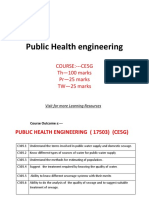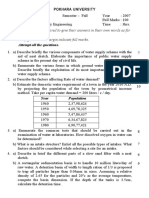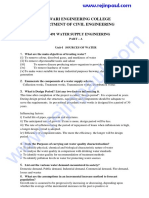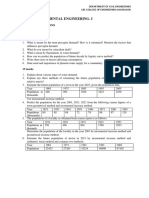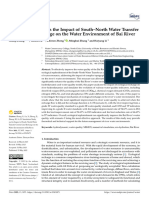0 ratings0% found this document useful (0 votes)
29 viewsWater Supply Engineering Set II
Water Supply Engineering Set II
Uploaded by
sushilThis document provides a 3 hour, 100 point exam for a Bachelor's level Water Supply Engineering course. The exam consists of 7 questions covering various topics in public water supply, including:
1) Objectives of public water supply and collection components like river and reservoir intakes.
2) Calculating total water demand for a rural village given population and livestock data from 1981 to a design year of 2022.
3) Differences between surface and underground water sources from quantitative and qualitative perspectives, and describing stream and river crossings.
4) Calculating water supply needs for a town of 200,000 people given varying daily demand percentages.
5) Explaining living organisms in water and various pipe materials
Copyright:
© All Rights Reserved
Available Formats
Download as DOC, PDF, TXT or read online from Scribd
Water Supply Engineering Set II
Water Supply Engineering Set II
Uploaded by
sushil0 ratings0% found this document useful (0 votes)
29 views2 pagesThis document provides a 3 hour, 100 point exam for a Bachelor's level Water Supply Engineering course. The exam consists of 7 questions covering various topics in public water supply, including:
1) Objectives of public water supply and collection components like river and reservoir intakes.
2) Calculating total water demand for a rural village given population and livestock data from 1981 to a design year of 2022.
3) Differences between surface and underground water sources from quantitative and qualitative perspectives, and describing stream and river crossings.
4) Calculating water supply needs for a town of 200,000 people given varying daily demand percentages.
5) Explaining living organisms in water and various pipe materials
Original Title
Water Supply Engineering set II.doc
Copyright
© © All Rights Reserved
Available Formats
DOC, PDF, TXT or read online from Scribd
Share this document
Did you find this document useful?
Is this content inappropriate?
This document provides a 3 hour, 100 point exam for a Bachelor's level Water Supply Engineering course. The exam consists of 7 questions covering various topics in public water supply, including:
1) Objectives of public water supply and collection components like river and reservoir intakes.
2) Calculating total water demand for a rural village given population and livestock data from 1981 to a design year of 2022.
3) Differences between surface and underground water sources from quantitative and qualitative perspectives, and describing stream and river crossings.
4) Calculating water supply needs for a town of 200,000 people given varying daily demand percentages.
5) Explaining living organisms in water and various pipe materials
Copyright:
© All Rights Reserved
Available Formats
Download as DOC, PDF, TXT or read online from Scribd
Download as doc, pdf, or txt
0 ratings0% found this document useful (0 votes)
29 views2 pagesWater Supply Engineering Set II
Water Supply Engineering Set II
Uploaded by
sushilThis document provides a 3 hour, 100 point exam for a Bachelor's level Water Supply Engineering course. The exam consists of 7 questions covering various topics in public water supply, including:
1) Objectives of public water supply and collection components like river and reservoir intakes.
2) Calculating total water demand for a rural village given population and livestock data from 1981 to a design year of 2022.
3) Differences between surface and underground water sources from quantitative and qualitative perspectives, and describing stream and river crossings.
4) Calculating water supply needs for a town of 200,000 people given varying daily demand percentages.
5) Explaining living organisms in water and various pipe materials
Copyright:
© All Rights Reserved
Available Formats
Download as DOC, PDF, TXT or read online from Scribd
Download as doc, pdf, or txt
You are on page 1of 2
POKHARA UNIVERSITY
Level: Bachelor Semester – Year : 2002
Programme: Full Marks: 100
Course: Watert supply Engineering Time : 3hrs.
Candidates are required to give their answers in their own words as far
as practicable.
The figures in the margin indicate full marks.
Attempt all the questions.
1. Describe objectives underlying public water supply. Discuss river and 15
reservoir intakes with sketches as collection components for public water
supply scheme.
2. a) A survey was carried out in 1981 in rural village of Gorkha district 10
and following data were obtained: population 5500, 2 offices, 1 health
post, a school with 250 day students, number of cows, goats, pigs and
chickens are 40,62,6,570 respectively.
Determine total water demand of the village for design year 2022 in
annual population growth rate is 1.80%
b) State different water borne disease with causes and examples of each. 5
3. Difference between surface and underground sources of water from 15
quantitative and qualitative point of view. Describe stream and river
crossing with neat sketches.
4. A tow with population of 2 lakhs needs water supply at 135 litres per 15
head. The variation in demand is as follows:
5am -5 am 25%of total
1 am – 12 noon 25%of total
12 noon – 17 pm 20%of total
17 pm – 19 pm 20%of total
19 pm – 24 midnight 10%of total
5. Explain living organism in water with suitable examples. Describe in brief 15
the various types of materials used for manufacturing of water supply
pipes.(Quality of water and Conveyance of water)
6. Define plain sedimentation. The dimension of setting zone of a continuous 15
flow rectangular sedimentation tank is 57m *19m*3m. Find flow velocity
of water for effective removal of 1.025 mm particles at 25 0 C. The
specific gravity of particle is 2.65 and kinematic viscosity for water is
taken as 0.9 centistokes.
7. Write short notes on (Any Two)
a) Reservoir intake
b) Jar test
c) Stream and river crossing
Testing of pipe
You might also like
- Exam Examples Water TreatmentDocument38 pagesExam Examples Water TreatmentBinyam Kebede50% (2)
- BSC Water Supply EngineeringDocument121 pagesBSC Water Supply Engineeringjebril yusuf100% (6)
- Public Health Engineering (CE5G)Document143 pagesPublic Health Engineering (CE5G)SandhyaNo ratings yet
- CE6503 Environmental Engineering IDocument16 pagesCE6503 Environmental Engineering Isree1072100% (1)
- Water Supply EngineeringDocument2 pagesWater Supply EngineeringsushilNo ratings yet
- 2081 Assessment QuestionsDocument3 pages2081 Assessment Questionstheiconchaudhary579No ratings yet
- Chapter 1 PHE FinalDocument8 pagesChapter 1 PHE FinalRuturaj ChavanNo ratings yet
- Candidates Are Required To Give Their Answers in Their Own Words As Far As Practicable. The Figures in The Margin Indicate Full MarksDocument2 pagesCandidates Are Required To Give Their Answers in Their Own Words As Far As Practicable. The Figures in The Margin Indicate Full MarkssushilNo ratings yet
- WATER Supply NetworkDocument17 pagesWATER Supply NetworkRinpal100% (3)
- Assisgnment - 1 ENVIRONMENTAL ENGINEERINGDocument4 pagesAssisgnment - 1 ENVIRONMENTAL ENGINEERINGSanthoshMBSanthuNo ratings yet
- Water Supply Engineering PDFDocument12 pagesWater Supply Engineering PDFAnu chavanNo ratings yet
- WSE 2 Marks With AnswersDocument18 pagesWSE 2 Marks With AnswersAravindhan MurugesanNo ratings yet
- Water Supply Network in Urban AreaDocument31 pagesWater Supply Network in Urban Areaankitmehta131100% (3)
- Enviromental and CPM Question PapersDocument3 pagesEnviromental and CPM Question PapersICE Group of Education BhopalNo ratings yet
- Sectoral Water Demand Question1Document4 pagesSectoral Water Demand Question1Acharya RabinNo ratings yet
- Palupi 1995Document9 pagesPalupi 1995auroraeaurelieNo ratings yet
- Design Water Supply Question Bank-1Document12 pagesDesign Water Supply Question Bank-1btsarmybts984No ratings yet
- Jss Academy of Technical Education, Noida Department of Civil EngineeringDocument1 pageJss Academy of Technical Education, Noida Department of Civil EngineeringHarshit Singh YadavNo ratings yet
- Examination Control Division: Subject: - Irrigation EngineeringDocument2 pagesExamination Control Division: Subject: - Irrigation EngineeringrahulNo ratings yet
- Hydrology & Irrigation Engg-V Sem - Complete NotesDocument164 pagesHydrology & Irrigation Engg-V Sem - Complete NotesBhargavReddy100% (3)
- Assessment of Ground Water Quality Using Fuzzy Based Water Quality IndexDocument6 pagesAssessment of Ground Water Quality Using Fuzzy Based Water Quality IndexInternational Journal of Innovative Science and Research TechnologyNo ratings yet
- chemistry Investigatory Project2Document18 pageschemistry Investigatory Project2jigarrajput.officialNo ratings yet
- Hydraulic StructureDocument56 pagesHydraulic StructureMahesh RamtekeNo ratings yet
- 3.MScWSDSE CourseDocument242 pages3.MScWSDSE CourseHawi EtanaNo ratings yet
- Lecture Outline: - Design of WaterDocument22 pagesLecture Outline: - Design of WaterLabib AbdallahNo ratings yet
- Water Supply Eng Sheet 4 Dr. Ehab Spring 2023 2024 PDFDocument4 pagesWater Supply Eng Sheet 4 Dr. Ehab Spring 2023 2024 PDFahmed.mo.12121313No ratings yet
- Water Supply EngineeringDocument2 pagesWater Supply EngineeringsushilNo ratings yet
- Unit I Wss Population Forecasting Intake Structure by R BhagatDocument82 pagesUnit I Wss Population Forecasting Intake Structure by R BhagatsonaliNo ratings yet
- CE6503 Environmental Engineering-I PDFDocument11 pagesCE6503 Environmental Engineering-I PDFsathishkumarNo ratings yet
- Model Question PaperDocument2 pagesModel Question Paper4si21cv008No ratings yet
- Water Resource Engineering IDocument3 pagesWater Resource Engineering IsushilNo ratings yet
- CET 307 SyllabusDocument12 pagesCET 307 SyllabusdipinnediyaparambathNo ratings yet
- MOWR Media Fellowship Program: Lecture byDocument22 pagesMOWR Media Fellowship Program: Lecture bybudhnabamNo ratings yet
- Work SheeetDocument3 pagesWork SheeetasregidhaguNo ratings yet
- Analysis of Variation of Water Quality in Kelani River, Sri LankaDocument6 pagesAnalysis of Variation of Water Quality in Kelani River, Sri LankaIJEAB JournalNo ratings yet
- Water Resource Engineering IIDocument2 pagesWater Resource Engineering IIsushilNo ratings yet
- Ee 1Document1 pageEe 1api-279049687No ratings yet
- Indore PortraitDocument8 pagesIndore PortraitAkshita JainNo ratings yet
- Hydrology NotesDocument164 pagesHydrology Notespraneetha reddy100% (1)
- Tutorial Sheet-1: Shri Ramswaroop Memorial Group of Professional CollegesDocument4 pagesTutorial Sheet-1: Shri Ramswaroop Memorial Group of Professional CollegesakhilNo ratings yet
- Hydraulic Performance Analysis 2014Document26 pagesHydraulic Performance Analysis 2014Esayas AsfawNo ratings yet
- Ce 405: Environmental Engineering-I: Important QuestionsDocument4 pagesCe 405: Environmental Engineering-I: Important QuestionsVahid AbdNo ratings yet
- Copy of WSTE Super Important Tie (1) PDFDocument4 pagesCopy of WSTE Super Important Tie (1) PDFsevenmemes08No ratings yet
- Suggestion Question CE - CECADocument6 pagesSuggestion Question CE - CECAAsish KukiNo ratings yet
- 11CV7DCIHSDocument2 pages11CV7DCIHSHARNITH EVILLNo ratings yet
- Candidates Are Required To Give Their Answers in Their Own Words As Far As Practicable. The Figures in The Margin Indicate Full MarksDocument2 pagesCandidates Are Required To Give Their Answers in Their Own Words As Far As Practicable. The Figures in The Margin Indicate Full MarkssushilNo ratings yet
- HYDROLOGY & WATER RESOURCES SyllabusDocument12 pagesHYDROLOGY & WATER RESOURCES SyllabusHarikrishna SNo ratings yet
- Assignment For ModuleDocument3 pagesAssignment For ModuleNishal CalebNo ratings yet
- 2017 Summer Model Answer PaperDocument17 pages2017 Summer Model Answer PaperShivam KaleNo ratings yet
- Simulation of A Long Narrow Type Constructed Wetland Using The Stream Model Q2KDocument6 pagesSimulation of A Long Narrow Type Constructed Wetland Using The Stream Model Q2KMartin Daniel Palacios QuevedoNo ratings yet
- 6 Water 15 01871Document23 pages6 Water 15 01871barleyzhangNo ratings yet
- Baripada 0Document71 pagesBaripada 0NOC DaradaNo ratings yet
- Drinking Water Quality of Chattogram CityDocument8 pagesDrinking Water Quality of Chattogram CityOvijith GoswamiNo ratings yet
- Sheet 1Document2 pagesSheet 1mostaf.prof2020No ratings yet
- Questions STPDocument22 pagesQuestions STPRabindra SinghNo ratings yet
- Civil-V-hydrology and Irrigation Engineering (10cv55) - NotesDocument164 pagesCivil-V-hydrology and Irrigation Engineering (10cv55) - NotesRaj Bakhtani100% (1)
- Nota WastewaterDocument120 pagesNota WastewaterMohd Izdiharudin Ibrahim100% (1)
- Groundwater Technology Handbook: A Field Guide to Extraction and Usage of GroundwaterFrom EverandGroundwater Technology Handbook: A Field Guide to Extraction and Usage of GroundwaterRating: 5 out of 5 stars5/5 (1)
- Melbourne's Water Catchments: Perspectives on a World-Class Water SupplyFrom EverandMelbourne's Water Catchments: Perspectives on a World-Class Water SupplyNo ratings yet
- Steel Moment-Resisting Frame 1994 Northridge Earthquake Federal Emergency Management AgencyDocument1 pageSteel Moment-Resisting Frame 1994 Northridge Earthquake Federal Emergency Management AgencysushilNo ratings yet
- Candidates Are Required To Give Their Answers in Their Own Words As Far As Practicable. The Figures in The Margin Indicate Full MarksDocument2 pagesCandidates Are Required To Give Their Answers in Their Own Words As Far As Practicable. The Figures in The Margin Indicate Full MarkssushilNo ratings yet
- Candidates Are Required To Give Their Answers in Their Own Words As Far As Practicable. The Figures in The Margin Indicate Full MarksDocument2 pagesCandidates Are Required To Give Their Answers in Their Own Words As Far As Practicable. The Figures in The Margin Indicate Full MarkssushilNo ratings yet
- Water Resource Engineering IIDocument2 pagesWater Resource Engineering IIsushilNo ratings yet
- Candidates Are Required To Give Their Answers in Their Own Words As Far As Practicable. The Figures in The Margin Indicate Full MarksDocument2 pagesCandidates Are Required To Give Their Answers in Their Own Words As Far As Practicable. The Figures in The Margin Indicate Full MarkssushilNo ratings yet
- Candidates Are Required To Give Their Answers in Their Own Words As Far As Practicable. The Figures in The Margin Indicate Full MarksDocument2 pagesCandidates Are Required To Give Their Answers in Their Own Words As Far As Practicable. The Figures in The Margin Indicate Full MarkssushilNo ratings yet
- System Software 2009 (Back)Document1 pageSystem Software 2009 (Back)sushilNo ratings yet
- Candidates Are Required To Give Their Answers in Their Own Words As Far As Practicable. The Figures in The Margin Indicate Full MarksDocument2 pagesCandidates Are Required To Give Their Answers in Their Own Words As Far As Practicable. The Figures in The Margin Indicate Full MarkssushilNo ratings yet
- Candidates Are Required To Give Their Answers in Their Own Words As Far As Practicable. The Figures in The Margin Indicate Full MarksDocument2 pagesCandidates Are Required To Give Their Answers in Their Own Words As Far As Practicable. The Figures in The Margin Indicate Full MarkssushilNo ratings yet
- Candidates Are Required To Give Their Answers in Their Own Words As Far As Practicable. The Figures in The Margin Indicate Full MarksDocument2 pagesCandidates Are Required To Give Their Answers in Their Own Words As Far As Practicable. The Figures in The Margin Indicate Full MarkssushilNo ratings yet
- Candidates Are Required To Give Their Answers in Their Own Words As Far As Practicable. The Figures in The Margin Indicate Full MarksDocument2 pagesCandidates Are Required To Give Their Answers in Their Own Words As Far As Practicable. The Figures in The Margin Indicate Full MarkssushilNo ratings yet
- Water Resource Engineering IDocument3 pagesWater Resource Engineering IsushilNo ratings yet
- Candidates Are Required To Give Their Answers in Their Own Words As Far As Practicable. The Figures in The Margin Indicate Full MarksDocument2 pagesCandidates Are Required To Give Their Answers in Their Own Words As Far As Practicable. The Figures in The Margin Indicate Full MarkssushilNo ratings yet
- Candidates Are Required To Give Their Answers in Their Own Words As Far As Practicable. The Figures in The Margin Indicate Full MarksDocument2 pagesCandidates Are Required To Give Their Answers in Their Own Words As Far As Practicable. The Figures in The Margin Indicate Full MarkssushilNo ratings yet
- Candidates Are Required To Give Their Answers in Their Own Words As Far As Practicable. The Figures in The Margin Indicate Full MarksDocument2 pagesCandidates Are Required To Give Their Answers in Their Own Words As Far As Practicable. The Figures in The Margin Indicate Full MarkssushilNo ratings yet
- Mechanism of LubricationDocument1 pageMechanism of LubricationsushilNo ratings yet
- Candidates Are Required To Give Their Answers in Their Own Words As Far As Practicable. The Figures in The Margin Indicate Full MarksDocument2 pagesCandidates Are Required To Give Their Answers in Their Own Words As Far As Practicable. The Figures in The Margin Indicate Full MarkssushilNo ratings yet
- Fly Level Booking Sheet Project:-Location:-: S.no BS IS FS Rise Fall HI Reduced LevelDocument2 pagesFly Level Booking Sheet Project:-Location:-: S.no BS IS FS Rise Fall HI Reduced LevelsushilNo ratings yet
- Cliquez Ici Pour Regarder Le Cours en FrançaisDocument5 pagesCliquez Ici Pour Regarder Le Cours en FrançaissushilNo ratings yet


